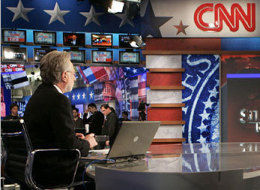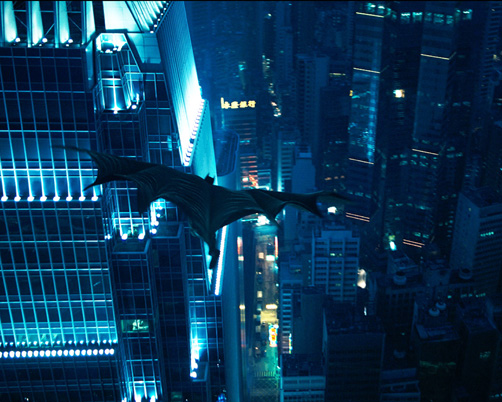 It's been a tough scene for film blogging lately, at least from where I'm sitting. There are so many film and media blogs on the web that I couldn't possibly try to surmise an overall state of blogging. But from my perspective, at least, there has been a minor lull in the past few months likely due to a combination of factors. Outside the Toronto and Telluride Film Festivals, it hasn't been a particularly exciting time for new releases. Moreover, a number of writers have probably been so attached to Presidential politics (myself included) that movies have taken a back seat to other concerns. Even a film as politically inflammatory as Oliver Stone's W. couldn't shake things up in film coverage. Then again, the idea of W. is more inflammatory than the film itself, which rather well sums up the state of movies in the last few months.
It's been a tough scene for film blogging lately, at least from where I'm sitting. There are so many film and media blogs on the web that I couldn't possibly try to surmise an overall state of blogging. But from my perspective, at least, there has been a minor lull in the past few months likely due to a combination of factors. Outside the Toronto and Telluride Film Festivals, it hasn't been a particularly exciting time for new releases. Moreover, a number of writers have probably been so attached to Presidential politics (myself included) that movies have taken a back seat to other concerns. Even a film as politically inflammatory as Oliver Stone's W. couldn't shake things up in film coverage. Then again, the idea of W. is more inflammatory than the film itself, which rather well sums up the state of movies in the last few months.It's worth noting that I have done nothing to help the situation, as I have taken my longest hiatus from The Cinematic Art since I started it in January 2007. My reasons for doing this ranged from the aforementioned waning interest in films by film culture at large, strange as that sounds. This coupled with my fervent, almost obsessive interest in the election and the media coverage of it made finding time and inspiration to write about movies difficult.
 In all fairness, the election was just one of a couple of things to occupy the majority of my time. The Philadelphia Phillies' unlikely journey to a World Series title was another. As a lifelong fan, hearing those words "And the Phillies are World Series Champions!" was one of those perfect and surreal moments. While elections and baseball championships make for great times (especially since the outcomes of both were as unexpected as they were joyous for me), nothing compares to what I experienced just six weeks ago, when my son was born. I can say without exaggeration that moment was the most humbling and illuminating of my short life, and it now lives in my memory as well as in my everyday experiences.
In all fairness, the election was just one of a couple of things to occupy the majority of my time. The Philadelphia Phillies' unlikely journey to a World Series title was another. As a lifelong fan, hearing those words "And the Phillies are World Series Champions!" was one of those perfect and surreal moments. While elections and baseball championships make for great times (especially since the outcomes of both were as unexpected as they were joyous for me), nothing compares to what I experienced just six weeks ago, when my son was born. I can say without exaggeration that moment was the most humbling and illuminating of my short life, and it now lives in my memory as well as in my everyday experiences. All of these things have contributed to my absence. I've had some time here and there to watch movies, among which Errol Morris' Standard Operating Procedure and Jonathan Demme's Rachel Getting Married stands out. I'll have more on these films in coming posts. But I don't want to stress myself out with writing full-out reviews at this juncture. It took me about four weeks without posting to actually feel content with not posting. Ironically, this has enabled me to begin writing again, stress free. I'll have some collected thoughts on movies again (and on blogging) soon, but for now I want to get my feet again, take it easy, and remember why I began doing this in the first place.
As I attempt to regain focus, it's only appropriate that the article I'll be commenting on was written by another blogger who has taken some time off and only recently re-emerged into the film blogosphere. Ali Arikan, whose Indiana Jones blog-a-thon yielded some nice analyses on the Indy pictures, has written his first post in several months, offering his reflections on the film event of the summer: The Dark Knight. His post is refreshing for a number of reasons; first, because after an influx of discussion about the film before, during, and immediately after its release, interest has dropped off. It's as if critics and bloggers collectively decided that we are all on Dark Knight overload for a while and balanced it out by abruptly cutting off major discussion about it.
 Given the context, it makes sense that Ali decided to write about this film for his return from blogging hiatus. But it's what he has to say about the film that's most interesting. He acknowledges the power of Christopher Nolan's juggernaut of a movie, but his implicit observation about the homogenized tone of the critical dialogue about the film is especially intriguing. In short, he's not buying the movie one bit, and for very different reasons than those presented by the film's detractors. He says:
Given the context, it makes sense that Ali decided to write about this film for his return from blogging hiatus. But it's what he has to say about the film that's most interesting. He acknowledges the power of Christopher Nolan's juggernaut of a movie, but his implicit observation about the homogenized tone of the critical dialogue about the film is especially intriguing. In short, he's not buying the movie one bit, and for very different reasons than those presented by the film's detractors. He says:"The Dark Knight is not a sequel to Batman Begins. The actors are the same, sure, and, thus, the characters, but they inhabit two completely different universes. A shadowy organisation of ninjas (none of them diminutive, alas) called The League of Shadows, run by a foppish Frenchman, and intent on razing Gotham, would feel completely out of place in the latter film. The Dark Knight doesn't just have a different tone, it plays a totally different instrument.
Gotham, too, looks different between the two films. In the first one, it has a reddish orange hue; it’s claustrophobic, and, even though I don’t want to use the word, gothic. In the second film, it just looks like Chicago. I know the first film was mainly shot on a soundstage, and that a big deal was made of the second film’s use of Chicago, but still, one would expect some sort of consistency.
Batman Begins is a superhero film that pushes its boundaries to the extreme. The Dark Knight is a film that obliterates those limits in the hopes of becoming a crime noir. And that would be a laudable intention, if it weren’t for the fact that it’s still a film about a guy who dresses up as a fucking bat and fights crime. It is because of its very essence that the film is inherently unable to make that leap towards serious crime drama. Batman Begins succeeds by remaining a superhero movie, The Dark Knight flounders by trying to abandon its roots.[5] And it’s not a pleasant sight."
In my original post on the film, I made a similar argument about the atmosphere and overall presentation of The Dark Knight. Where my thesis was buried in a sea of arguments, Ali directly critiques the movie for its almost complete lack of resemblance to the Batman Begins. Where Begins found a balance between the hero myth and a gritty cynicism. The film blended two very different sensibilities into an ambiguous tone that actually achieved both. The Dark Knight is just about the reverse of that. Thematically, its covering some similar territory, but the movie could not be any different from Begins from an aesthetic point of view. Moreover, that it almost completely shuns the cloudy tones of the first film is jarring.
I have only seen the film once, and I look forward to seeing it again. But on first viewing, the movie failed as both a crime saga and a representation of the hero myth. It failed to build upon anything established in the first film. As Ali notes, we're listening to a different instrument altogether. Equally important as that fact is how little it has figured into the greater discussion about the film. Although a number of critics / bloggers have grown tired of talking about The Dark Knight, we've really only just begun to comprehend its relevance as both a cultural artifact and a piece of cinema.
1 comment:
I've been of the mind that the true pivotal character of The Dark Knight isn't Batman, or the Joker, or even Harvey Dent--it's Jim Gordon, the real-life everyman stuck between these fantastical comic-book entities. And I'm glad Gordon is played by the ever-great Gary Oldman, who's deserved this type of blockbuster role for years.
Post a Comment